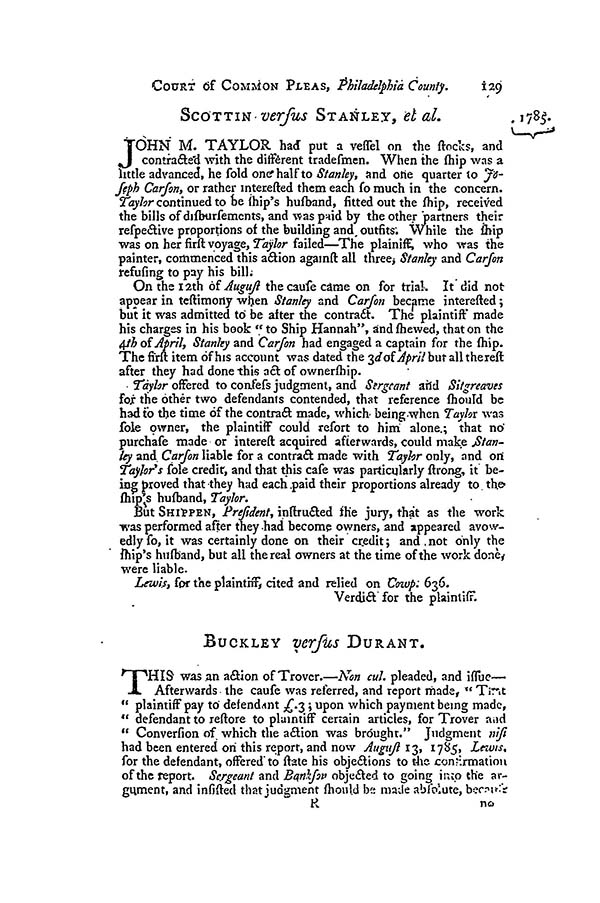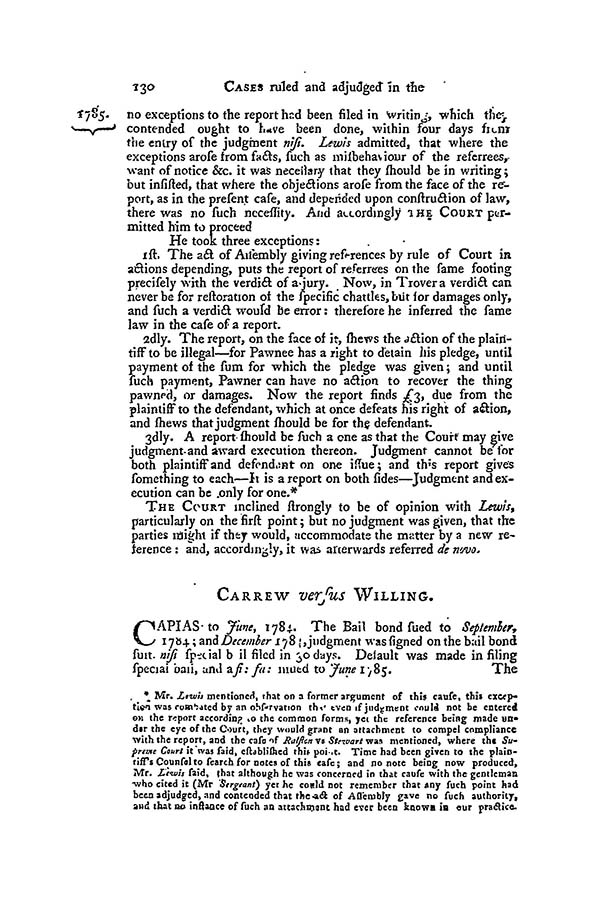Scottin v. Stanley, 1 Dall. 129 (C. P. Phila. Cty. 1785) and Buckley v. Durant, 1 Dall. 129 (C. P. Phila. Cty. 1785)
Scottin versus Stanley, et al.
John M. Taylor had put a vessel on the stocks, and contracted with the different tradesmen. When the ship was a little advanced, he sold one half to Stanley, and one quarter in Joseph Carson, or rather interested them each so much in the concern. Taylor continued to be ship's husband, fitted out the ship, received the bills of disbursements, and was paid by the other partners their respective proportions of the building and outfits. While the ship was on her first voyage, Taylor failed—The plaintiff, who was the painter, commenced his action against all three, Stanley and Carson refusing to pay his bill.
On the 12th of August the cause came on for trial. It did not appear in testimony when Stanley and Carson became interested; but it was admitted to be after the contract. The plaintiff made his charges in his book "to Ship Hannah", and shewed, that on the 4th of April, Stanley and Carson has engaged a captain for the ship. The first item of his account was dated the 3d of April but all the rest after they had done this act of ownership.
Taylor offered to confess judgment, and Sergeant and Sitgreaves for the other two defendants contended, that reference should be had to the time of the contract made, which being when Taylor was sole owner, the plaintiff could resort to him alone; that no purchase made or interest acquired afterwards, could make Stanley and Carson liable for a contract made with Taylor only, and on Taylor's sole credit, and that his cafe was particularly strong, it being proved that they had each paid their proportions already to the ship's husband, Taylor.
But Shippen, President, instructed the jury, that as the work was performed after they had become owners, and appeared avowedly so, it was certainly done on their credit; and not only the ship's husband, but all the real owners at the time of the work done, were liable.
Lewis, for the plaintiff, cited and relied on Cowp. 636.
Verdict for the plaintiff
Citation: Scottin v. Stanley, 1 Dall. 129, 1 U.S. 129 (C. P. Phila. Cty. 1785)
Buckley versus Durant.
This was an action of Trover.—Non cul. pleaded, and issue.—Afterwards the cause was referred, and report made, "That plaintiff pay to defendant £.3; upon which payment being made, defendant to restore to plaintiff certain articles, for Trover and Conversion of which the action was brought." Judgment nisi had been entered on this report, and now August 13, 1785, Lewis, for the defendant, offered to state his objections to the confirmation of the report. Sergeant and Bankson objected to going into the argument, and insisted that judgment should be made absolute, because
He took three exceptions:
1st. The act of Assembly giving references by rule of Court in actions depending, puts the report of referrees on the same footing precisely with the verdict of a jury. Now, in Trover a verdict can never be for restoration of the specific chattles, but for damages only, and such a verdict would be error: therefore he inferred the same law in the case of a report.
2ndly. The report, on the face of it, shews the action of the plaintiff to be illegal—for Pawnee has a right to detain his pledge, until payment of the sum for which the pledge was given; and until such payment, Pawner can have no action to recover the thing pawned, or damages. Now the report finds £3, due from the plaintiff to the defendant, which at once defeats his right of action, and shows that judgment should be for the defendant.
3rdly. A report should be such a one as that the Court may give judgment and award execution thereon. Judgment cannot be for both plaintiff and defendant on one issue; and this report gives something to each—It is a report on both sides—Judgment and execution can be only for one.*
The Court inclined strongly to be of opinion with Lewis, particularly on the first point; but no judgment was given, that the parties might if they would, accommodate the matter by a new reference: and, accordingly, it was afterwards referred de novo.
Citation: Buckley v. Durant, 1 Dall. 129, 1 U.S. 129 (C. P. Phila. Cty. 1785)


Last modified: December 5, 2014